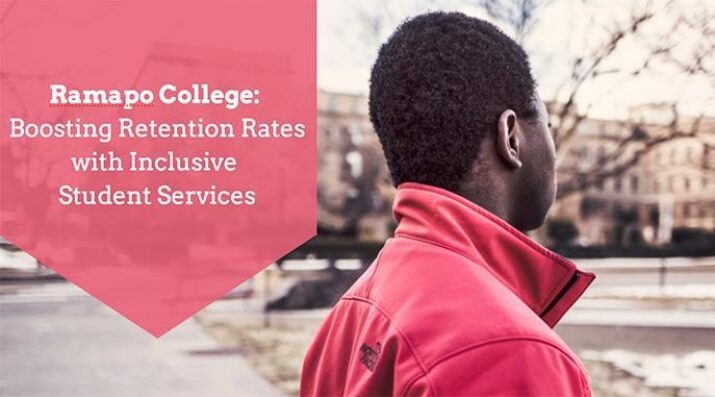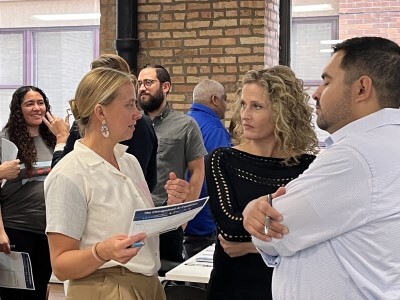Technology Tools
Ramapo College: Boosting Retention Rates with Inclusive Student Services
Topics

Educators often take advantage of educational technologies as they make the shifts in instruction, teacher roles, and learning experiences that next gen learning requires. Technology should not lead the design of learning, but when educators use it to personalize and enrich learning, it has the potential to accelerate mastery of critical content and skills by all students.
In the constellation of university life, transfer students can feel as though they don't exactly fit in. Here's how one college is looking to change that.
In the constellation of university life, transfer students can feel as though they don't exactly fit in. Their experiences are typically markedly different from those of incoming freshman. Despite their lack of familiarity with an institution, this student group doesn't often receive the same orientation to university processes or campus life.
Established in 2015, the Integrated Planning and Advisement for Student Success (iPASS) grant, which is funded by the Bill & Melinda Gates Foundation and the Leona M. and Harry B. Helmsley Charitable Trust, was designed to address these challenges.
How exactly can the transfer student experience be improved? Recognizing institutional shortcomings and determining what changes to implement are only the beginning. The journey is long, and involves a variety of stakeholders.
An iPASS grant recipient, Ramapo College of New Jersey, in Mahwah, New Jersey is attempting to do just that. While some of their work has involved planning and advising services for all students, the college—which attracts transfer students from a number of regional community colleges—has paid special attention to services catering to this particular group.
It's easy to understand why: transfer students make up 35 percent of the total student population of 5,800. The majority of them come from County College partners in the region. Up until recently, however, transfer students weren't persisting toward a degree at the same rate as students who started their first year of college at Ramapo … and the college took notice.
Joe Connell, Assistant Vice President of Student Success, reflected on the transfer experience he encountered at Ramapo College shortly after he arrived in 2012. "Some of our transfer students were getting lost in the swirl. They needed help with navigating and degree planning for a particular school within the college; they also needed a point of contact who could help with next steps, view and reference their academic plan, etc." he explained.
A Renewed Focus on Transfer Students
Led by Connell, the advising team in the Center for Student Success has been changing the way they structure services. Their strategies have begun paying off.
Thanks to new initiatives, Ramapo College's one-year retention rate for transfer students has significantly increased. The institution went from offering somewhere close to the minimum in terms of its advising services, to developing a movement toward best practices.
Just how did they do it?
Previously, transfer students were required to attend a one-time orientation session. While typical advising services existed akin to those for all students, there was no enforcement regarding attendance or participation.
Shortly after assuming his current role, Connell knew that implementing mandatory advisement would help. But first, his team had to gain buy in, and build a coalition. "We took baby steps in order to gain support," he said.
Connell has advice for those eager to make changes to their advising programs. He stressed that institutional teams need to simply get started rather than getting locked in the brainstorming phase. "Take action and begin your initiative by creating a three-year roadmap," he said. "Then you can work backwards to see what milestones you need to reach in order to achieve those goals."
If administrators are unsure where to begin, Connell has practical tips for them, too.
"Look at what currently works for first-year students on your campus, and build upon those existing models. That way, you'll be creating a sustainable structure rather than a one-off solution for one segment of your student population."
At Ramapo College, transfer students were added to the institution's early alert system—a move which has captured two years of data, offering further insights into students' needs and the impact of advising services.
Promising Early Results
Back in 2012, the retention rate for transfer students had a three-year average of 78 percent. Today that figure is closing in on 85 percent.

Connell acknowledged that one aspect of the college that was perhaps unique among the iPASS cohort is that they were already in the throes of revamping their advising processes.
"This fits within our overall strategic plan; iPASS already dovetailed with ongoing efforts," he added.
By the time fall 2014 rolled around, transfer students' mandatory advising programs looked very similar to that of a traditional first-year student. They had orientation, welcome week, mandatory first year advising activities, and then more in-depth sessions in their transition year to strengthen connections and build a roadmap for academic success.
Their next step for the college in its outreach to three County College partners is a program called 'Archway to Ramapo'.
Connell explained: "If students choose to join and maintain at minimum a 2.75 GPA, they will gain access to some of the opportunities and experiences that our current students have. For example, this could involve meeting with a transfer student advisor on their home campus every semester. Rather than having to go through the application process and wonder about enrollment, they'll simply need to provide appropriate documentation and will automatically be admitted to Ramapo College."
Then there are the activities. Those in the program gain access to special welcome events, as well as lectures or panels related to their major, along with internship and networking opportunities.
For example, prospective transfer students (sometimes, also their parents) are invited to partner events at the County College campus and at Ramapo College. Program members who are interested in majoring in the visual arts will receive invitations for an upcoming guest speaker in the discipline. Those seeking internships also will have access to Ramapo's opportunities and consultations with alumni.
The feedback speaks for itself. One transfer student shared his experience in a note to his advisor at Ramapo College: "When I came to see you, you helped me through the all the processes from my application, how to choose my major, and completing a plan with all of the classes I needed to take, and I thought it was very helpful. I was more than grateful that you were there and that BCC allowed you to be there; it made it very easy for me."
With initial advising efforts already bearing fruit, Ramapo College and its transfer student population are poised for greater success.




